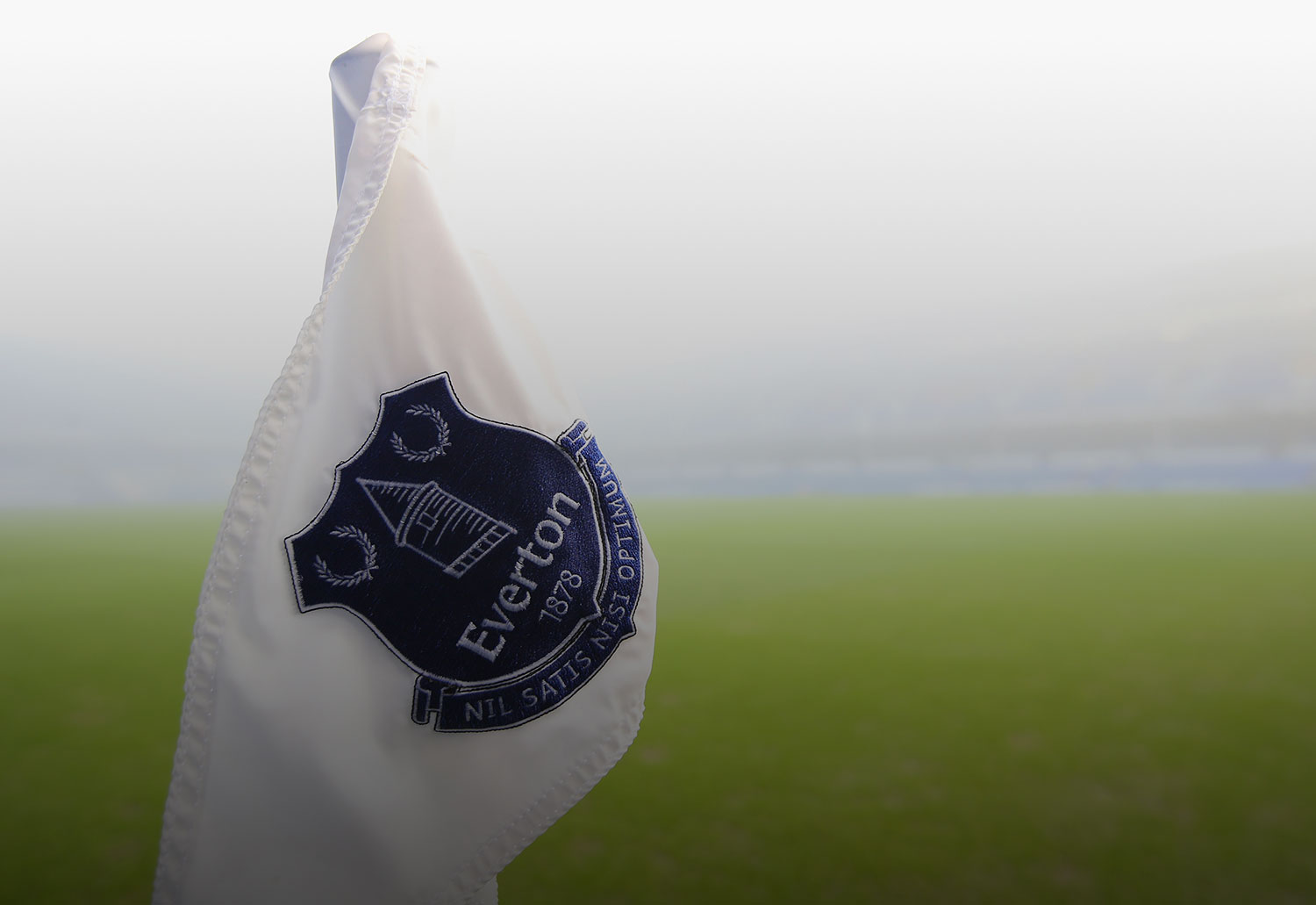There is an enormous amount of despondency among Blues in the wake of another massacre at the hands of a top-six side, and Arsenal in particular, on Saturday. Everton simply disintegrated again in the face of superior opposition who exploited almost non-existent defending and were 4-0 up by half time.
While there have been worse capitulations in the Toffees' 140-year history — they were 6-1 down at half time when they lost 10-4 at Tottenham in 1958, for example — it was an unprecedented turn of events in the Premier League era. Video that has surfaced on social media of dejected Evertonians filing out of the Emirates well before the half-time whistle was emblematic of this horrendous season and the depths to which the most expensive Everton team ever assembled have sunk.
It may feel like it but this is by several degrees not the worst Everton side of the Premier League era but they have turned in some of the poorest, most gutless displays most of us have ever witnessed from our club. There is talent in the squad, some of it massively over-priced, some of it under-utilised or badly coached, but most of it under-performing to a shocking degree and this latest humiliation, by a manager and team not exactly enjoying the most favourable press or support from its fans themselves, has damaged further its relationship with Blues supporters.
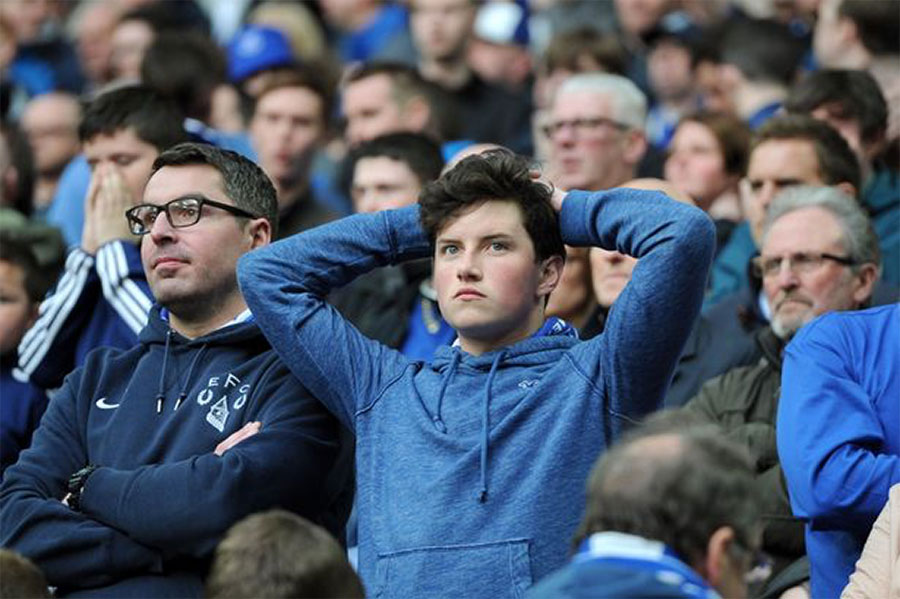
Evertonians have suffered through on-field crises before, of course, and come out of them; sometimes through what felt like the sheer indefatigable will of the Evertonian collective, as was the case in 1994 and 1998, and sometimes through resolute management together with a sense of duty from — or community among — the players, as was often the case under David Moyes.
Ultimately, there was disenchantment with the Scot whose protracted tenure at Goodison Park came to reflect his dour demeanour and since the brief spark that was ignited by the rich promise of Roberto Martinez's first season in charge, the arrival of financial muscle in the form of Farhad Moshiri and the potential that existed in the appointment of Ronald Koeman, there has been rising engagement from Blues fans.
Season ticket uptake has been at record levels recently, home attendances have hovered around capacity, and Everton are notably one of the best-supported teams on their travels, regardless of the venue or distance involved.
There are limits to that patience, however, and it feels like we are fast reaching a tipping point. The gathering chorus from that core support questioning the point of mustering the energy, time and money to follow this team far and wide if its hugely-compensated players and manager continue to serve up such abject fare should sound loud alarm bells in the Boardroom.
There is an increasing feeling of disillusionment and disenchantment from Evertonians with their team; in a game awash with money, an unavoidable risk of alienation of the ordinary match-going public by players earning millions of pounds a year. There's a symbiosis at play based on entertainment and effort on the field on the one hand and attendance, vocal backing and match revenue on the other that holds the whole thing together but it's neither finite nor impervious, particularly to a perceived lack of effort on the field.
To that you can also add a growing feeling of a loss of Everton's identity as a whole, an increasingly common refrain, something that was perhaps inevitable given the pace of change off the pitch over the past two years but which could have been managed or largely offset by tangible evidence of overall progress. Indeed, if it weren't for the prospect of a waterfront stadium and the potential that exists in both Moshiri's resources and his ambitions for the club, you suspect the fallout from this season might have been a good deal more damaging.
In raising the dream of a new home on the Mersey, consolidating Everton's various outstanding loans, putting the club back on a sound financial footing and investing to a historic level in team, Moshiri has built up significant currency with the bulk of the fanbase. Much like the club's see-what-sticks approach to recruitment, however, he has been spending that currency at an alarming rate.
The new major shareholder has clearly had some costly mis-steps that have undermined what should have been the most important season for Everton in 12 years but among the doom, the gloom and the frustration, things aren't so bad that there isn't a path out of the mess. To plot their way back on course, however, some big decisions are going to need to be made in the next few months.
* * * * * * * * * * * * * * * * * * * * * * * * * * *
“It's the Players!”
“Spineless! Disgrace! Not fit to wear the shirt!” The adjectives and the invective flew on Saturday evening on social channels and fan websites from those who could work up enough anger to overcome the enveloping desperation at what they had witnessed from an Everton team at the Emirates. And no wonder; the first-half performance — the first 20 minutes in particular — were as bad, if not worse, than anything Blues have witnessed from their team in any era. There was a dereliction of basic duty on show from certain individuals that beggared belief, intensifying the temptation to put the blame, as their manager did, for this wreck of a season at the feet of the players.
There is some justification for that. Allardyce remarked after the defeat at Tottenham (another shocking Everton performance) that he hadn't fathomed this team's propensity to fall apart as they had done at times under Ronald Koeman and David Unsworth until he had seen it with his own eyes. His attempts to address it have thus far failed.
There is clearly a deep, underlying issue at Finch Farm but it's hard to pinpoint what, exactly, it is. “They've downed tools for three different managers!” has become a mantra for some supporters but 38 different players have turned out for Everton this season. On the Venn diagram of players who played in the half-dozen worst displays of the season so far, there isn't a single outfield player who featured in them all.
And, in truth, this weak-livered characteristic that seems to pervade the squad goes back to the Martinez era and, surely, they can't all have been infected with a lack of discipline and application even if certain individuals have very clearly been going through the motions all season.
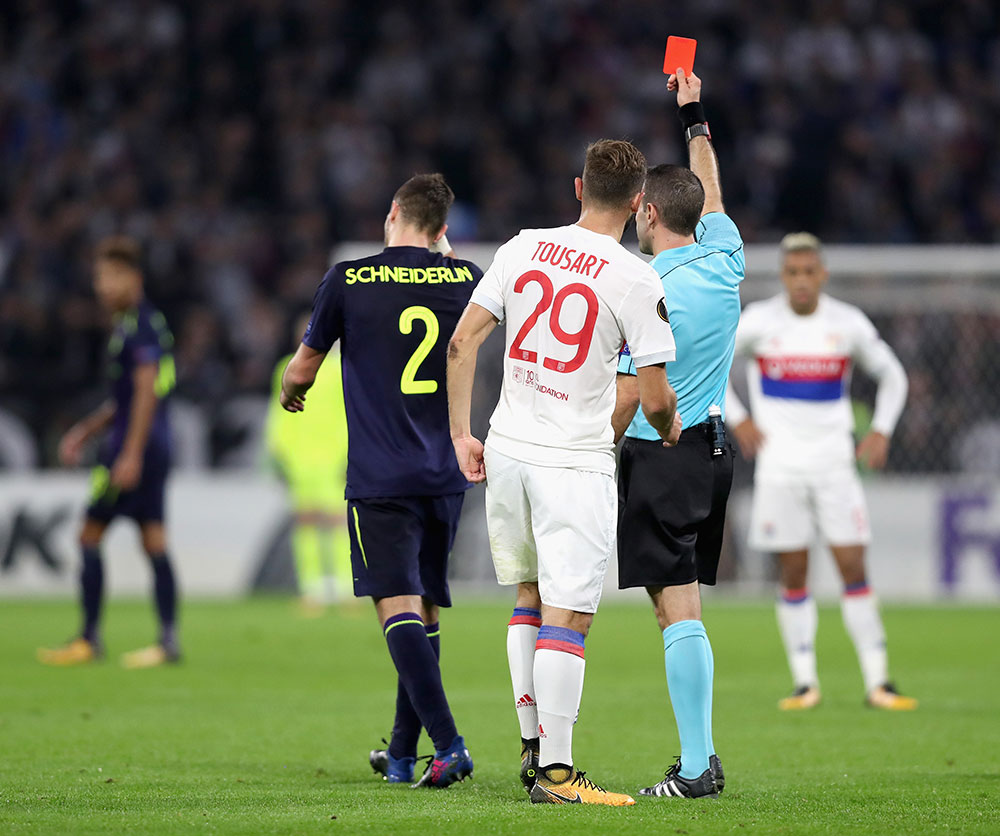
More likely is a feeling of disorientation and crushed morale brought on by a multitude of factors — a massively flawed recruitment strategy that overloaded some areas of the team but neglected gaping holes in others, suspect and infuriatingly myopic tactics combined with an aloof demeanour from Koeman, and then uncertainty and instability during David Unsworth's protracted stint as caretaker boss. Allardyce's myopic and inconsistent tenure has only perpetuated what went before.
In a team game of 11 men, it can be difficult for players as individuals to perform at even a basic level if everything is breaking down in unison around them and that was very much in evidence at the Emirates where no one seemed to know their responsibilities or be able to cope as Arsenal tore them apart. As a one-off, it could be passed off and moved past but there's a worrying frequency to the Blues' collapses that speaks to a psychological fragility running through the squad.
It's why, rather than chopping and changing personnel and formations, Allardyce's focus should have been carrying out what he promised — make things simple, consistent and, eventually, familiar. Instead, his brief tenure has been notable for inconsistency, negativity and a suffocating lack of inspiration.
It feels — it remains to be seen if it's true — as though the win over Leicester and a “this can't happen again”-level performance against Arsenal has indeed made things very simple for Allardyce going forward — stick with a settled team made up only of those committed to the cause and which plays to Everton's strengths.
That means the abandonment of this attitude from the manager whereby a player's worth to this team is judged based on his transfer value and rewarding players who make a genuine contribution to the side. The clamour for Morgan Schneiderlin, a player who has been a liability almost every time he has played this season, to be dropped for good now needs to be answered. Despite his tender years, Beni Baningime has shown more passion and tenacity in his few run-outs than the Frenchman, making a mockery of both the transfer fee and six-figure wages Schneiderlin has commanded.
Despite a decent display against Leicester, Michael Keane has too often looked utterly lost at centre half and he probably needs to be benched until results, not to mention his confidence, improve as well. Mason Holgate has looked more consistent than the signing from Burnley as has Phil Jagielka when he has played, and now there is additional competition posed by Eliaquim Mangala.
In Seamus Coleman, the Blues have a natural leader, source of inspiration and attacking threat down the right who can combine effectively with Theo Walcott who already looks to be an excellent addition to the line-up.
With Idrissa Gueye as the tackle-anything-that-moves disruptor sitting in front the back four, Wayne Rooney offering the ability to spread the ball around and Tom Davies providing energy and directness, Everton have the makings of an effective central midfield unit.
And in complete contrast to Allardyce's assertion that Gylfi Sigurdsson and Rooney can't play in the same side, Everton's record shows that they have won two thirds of the games in which the pair have started and none when they don't. The Icelandic international is demonstrably better in a central role so play him there.
Finally, like Sandro Ramirez, Cenk Tosun clearly isn't suited to the lone striker role but with Walcott's versatility and attacking abilities, he need not be deployed as one. Both new signings could dovetail quite effectively if Everton could keep the ball on the deck and attack with pace rather than slinging it forward from the back in the vain hope of winning the second ball.
In the short term, then, the immediate priority of staying in the Premier League should take care of itself unless things really do implode again at Goodison. Everton likely only need three more wins to guarantee safety and a favourable run of fixtures between now and the next meeting with a top-six side means that they should be close to achieving it by the end of March.
In the medium term, however, some more deep-seated issues need to be urgently addressed, starting with the man charged with taking this team forward next season and the apparently flawed recruitment setup at Finch Farm.
* * * * * * * * * * * * * * * * * * * * * * * * * * *
“It's the Manager!”
2017-18 may already be a write-off and the whole club may feel like it has fallen irretrievably far behind its former peers who now form a seemingly impregnable bloc in the top six but things aren't necessarily as bad as they seem. There is enough of a foundation in place on which things can be stabilised and rebuilt if, for the long-term health of the “project”, some cold, calculated decisions are made in the coming weeks.
Some of those involve select members of the squad but the twin 800lb gorillas in the room are issues surrounding the manager and the rather nebulous role of director of football at Everton.
While plenty of criticism has been aimed at the players this season, the buck inevitably and invariably stops with the manager, particularly a self-admitted man-manager and analyst of players' strengths like Allardyce. Were he to complete Everton's revival and achieve a seventh-place finish this season, he would certainly have grounds for requesting an extension to the 18-month contract he signed in November. By the same token, he must take the lion's share of the blame for the jumbled inconsistent mess over which he currently presides and doesn't seem able to fix.
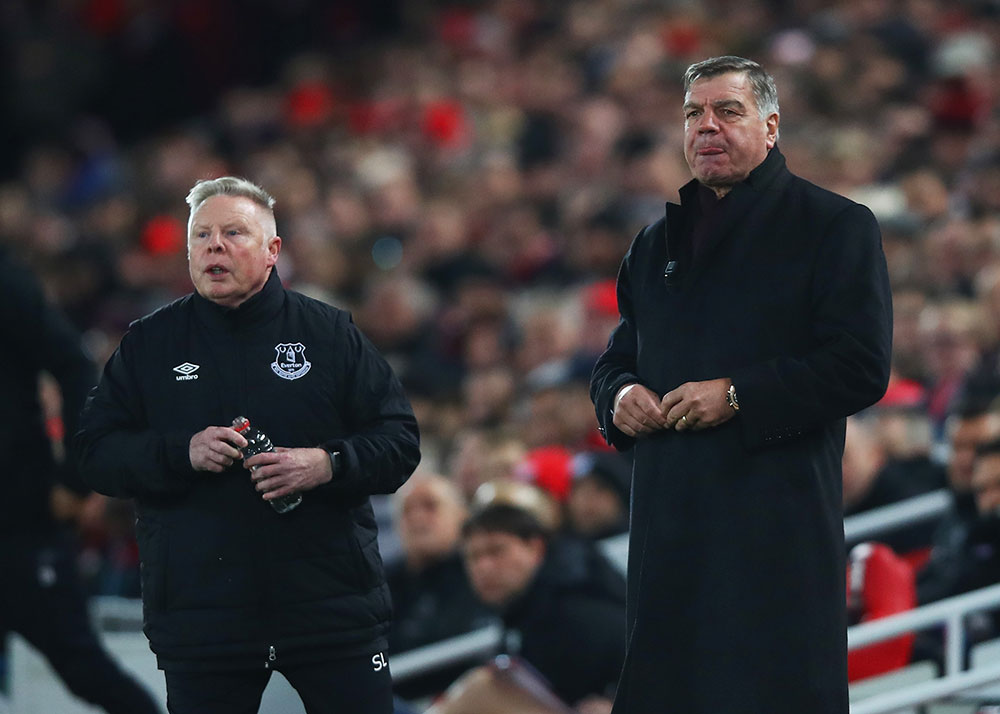
Having witnessed the dramatic fall-off of results and performances from the Blues that began after the home win over Swansea and which has accelerated under Allardyce since the turn of the year, it's hard not to surmise that there is something fundamentally lacking between the players and the manager — be it a connection, understanding, respect or all of the above.
If you needed to point to a particular facet of Allardyce's tenure thus far that encapsulates the misfit manager's unsuitability to the Everton project beyond May — let alone 18 months — the situation surrounding Ademola Lookman provides it. The talented forward has become the poster child for supporter frustration with Allardyce's management of late and the timing of his debut goal for Red Bull Leipzig was ideal for reporters to quiz him on whether the 20-year-old could have made a difference in Everton's 5-1 humbling by Arsenal.
“I've got Yannick Bolasie who cost thirty million quid and Theo Walcott who cost twenty million quid and both have a lot more experience than Lookman, so no,” Allardyce retorted.
“If you'd put him out there, he wouldn't have done any better because the whole team played crap.”
He is right, of course. Everton were crap and Lookman probably wouldn't have made much difference to the result; in the context of the latest miserable Blues performance, Lookman's loan to the Bundesliga and the arguments over its merits were largely immaterial.
But what Leipzig's faith in their new signing crystallised was the very argument that many Evertonians have been making since Christmas about Lookman and other young players like Nikola Vlasic: namely, that they should have been used as impact substitutes to influence close games (like when you're away from home and it's goalless — Boxing Day at West Brom, anyone? — and you need someone to come off the bench and score a winner), not starting matches on a regular basis.
The manager's comments are illustrative of a blinkered attitude that favours price tag, age or supposed reputation over ability, enthusiasm or potential impact, an attitude that was exposed as fallacy by the contributions off the bench of Davies and Dominic Calvert-Lewin against Arsenal at the weekend and stunningly lackadaisical showing from Schneiderlin.
The Everton job was, of course, Allardyce's chance to shed his image as a one-dimensional manager only able to fulfil the single brief of keeping teams in the Premier League. But his tenure to date hasn't revealed much appetite — or, perhaps, more accurately, any ability — to demonstrate that he is deserving of a plum job at one of the biggest clubs in England.
While perhaps also indicative of the financial pain that he has endured paying vast sums to settle first Martinez's and then Koeman's contracts, the relatively short-term nature of the terms offered to Allardyce suggests that Moshiri hired him with the expectation that it wouldn't be an arrangement for the long haul. Rather, it would buy him time until the end of the season to line up someone younger, more dynamic and better suited overall to the club and the role.
After the failure of the Koeman project, one that only felt like it had a three-year time horizon if he were successful, there is something highly appealing about the notion of bringing in a long-term hire again. One willing to build a team centred around an ethos and a set style of play rather than the anonymous inconsistency that has dogged the Blues for the past couple of years.
If that is indeed the strategy and the major shareholder has been holding out for a young Portuguese candidate to take the reins, then opportunity could knock as soon as the Blues reach 40 points.
Moshiri's favoured candidate, of course, Marco Silva, is already freely available and if the plan was only to keep Allardyce on until May and if the former Watford boss remains at the top of the shortlist, perhaps only professional courtesy or a desire to reach guaranteed safety from the drop first has kept the Everton Board from pulling the proverbial trigger.
Selecting Silva always carried a significant element of risk, even before the nose-dive in the Hornets' form that precipitated his departure from Vicarage Road, but if there is anything to reported rumours this week, it won't stop Chelsea from looking his way if they decide to fire Antonio Conte. What the 40-year-old does offer, though, is the chance to bed in a young manager who can kickstart a new five-year plan. Attentive to detail, tactically savvy and ambitious, Silva would be an appointment more reminiscent of Moyes or Martinez, at least in terms of taking ownership of a team and its identity.
His compatriot Paulo Fonseca is a manager of a similar mold. Just four years Silva's senior, Fonseca has been carving out a burgeoning reputation of his own with Shakhtar Donetsk, having successfully guided them to the knockout stages of the Champions League.
Shakhtar's hierarchy very firmly closed the door on any attempt by Everton to prise him away a few months ago, preferring that he at least see out his contract which is up for renewal this year. But with the season in Ukraine coming to a close next month, by which time the Miners could already be out of Europe, Moshiri's window of opportunity could soon open.
Whatever happens, whether Allardyce sees out his contract or a new man is brought in this summer, there is plenty to work with at Everton despite the crises the club has lurched to and from this season on the pitch. While it will need some sorting out, there is the makings of a very good side among the new signings and established, reliable pros.
Meanwhile, a fertile academy has furnished the current squad with four players capable of playing week in, week out in the first team and making a positive contribution. Cherry-picked youth from elsewhere like Calvert-Lewin and Lookman also have bright futures at the club.
In order to bridge the gap back to the top six, however, the club needs to make targeted signings of real quality to take the Blues to the next level and there the onus rests on a recruitment arm that does not, at present, look equipped to handle the task.
* * * * * * * * * * * * * * * * * * * * * * * * * * *
“And What Do You Do?”
It's easy to forget sometimes given all that's gone on at Everton recently that Farhad Moshiri has only been at the club for two years. In some respects, in his desire to effect a revolution at Goodison Park, he has tried to run before he could walk and nowhere has that been more evident than in player recruitment.
Unprecedented sums of money have been spent on new players since he came on board, with over £200m splashed out in the last year or so alone but seemingly without an overarching plan. £20m to £30m apiece has been splashed out on a number of players — Sigurdsson was, of course, acquired for a good deal more — overloading some areas of the squad while completely neglecting others.
It's proof positive that you can't just throw gobs of money at a team and expect it to gel but the scattergun approach speaks to the lack of an overarching strategy and has led to confusion over where the division of responsibility over scouting and choosing players lies.
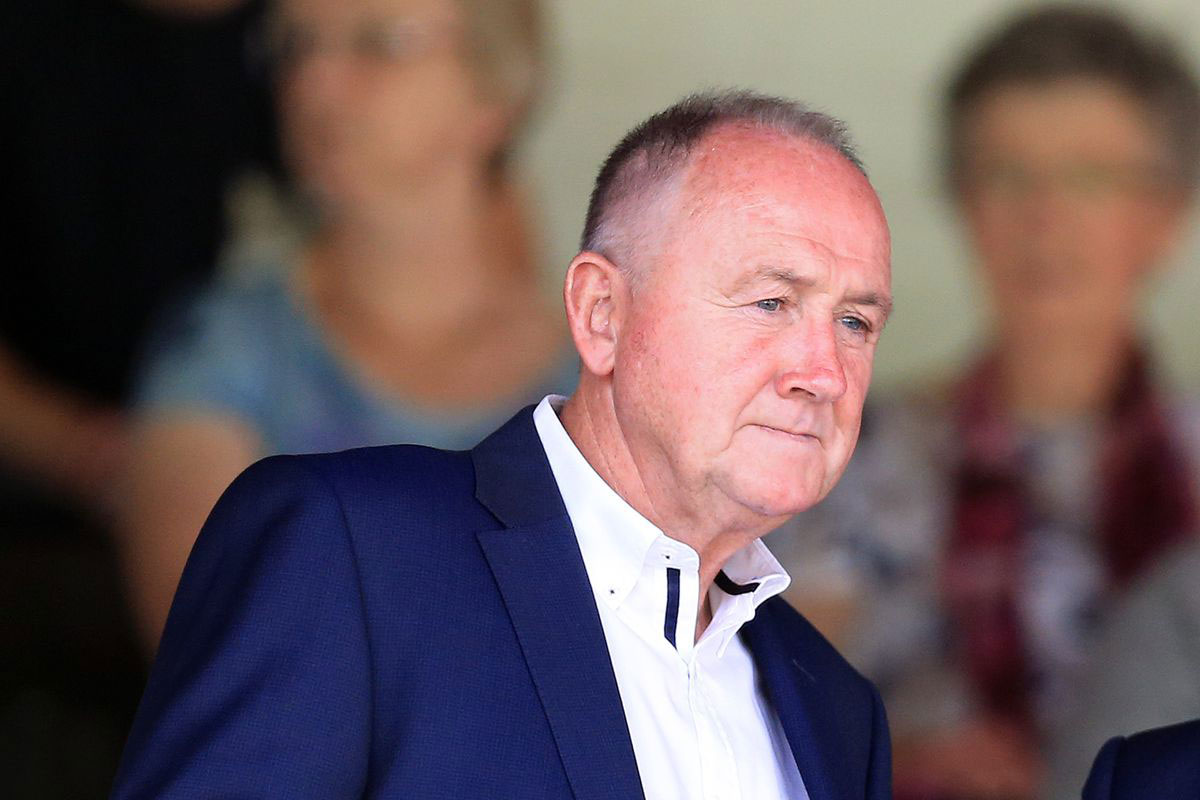
That, too, might not be all that surprising given that Steve Walsh has only been in what is an inaugural Everton Director of Football role for 18 months. But with the high-profile position comes high-level scrutiny and as glaring holes in the squad have gone unfilled and certain signings have fallen flat, more and more supporters and pundits have been questioning just what it is that the former Leicester scout does.
As such, if you shine a harsh light on the recruitment side of the club under Moshiri, the Steve Walsh experiment has largely failed to date — but that's not to say it can't work if a clearer mandate for him can be established and he can be partnered with the right managerial appointment. (Indeed, drafting in a man who has worked under a similar framework could lay the groundwork for a more fruitful relationship between head coach and sporting director.)
From what can be gleaned from Walsh's own explanation and that of Allardyce, there is a shared role in identifying, selecting and then recommending players for purchase but what has been missing is the sense that the director of football is clearly that — a director, responsible for shaping transfer policy, taking ownership for the quality of the squad and ensuring that the squad is fit to wage campaigns on multiple fronts by the time the summer transfer window closes.
That patently wasn't the case last August; indeed, where there should have been prudence and oversight there was overt negligence. A 25-goal striker was allowed to leave without a viable and reliable replacement lined up and no cover was brought in either for the left side of central defence or left back. The results of those failings were predictable and damaging.
The strength of Koeman's own will and convictions may have been factors behind the acquisition of certain players but ensuring that vital positions were filled must surely have been within Walsh's remit.
They may have contributed to a lost season but in terms of Everton's future, they are not unsolvable issues and they present opportunities for introspection within the club and improvement going forward. Whether that is with Walsh in the same role or with a more experienced sporting director in place remains to be seen.
* * * * * * * * * * * * * * * * * * * * * * * * * * *
It seems inconceivable based on the chaos that has underpinned this season but Everton go into the final 12 games of the season sitting just five points off seventh place. A relatively softer patch in the fixture calendar offers up the chance to close that gap if Allardyce can steady the ship again and put together a run of results. Finishing 2017-18 in the same position as last season, a campaign in which the Blues looked considerably stronger after New Year than they have this time around, would be some achievement.
Much of that is owed to the paucity of quality in the Premier League outside the top six and it shouldn't be allowed to mask the problems that brought the “R” word back into the Evertonian lexicon this season in the first place. There is also the danger that the team could continue to struggle but with just nine or 10 points needed to dispel fears of relegation, there should be enough points banked already to preserve Everton's Premier League status.
Solving the question of who gets to take this team forward starting in the summer - to these eyes, it has to be under a new manager - while also finding clarity in around recruitment will then be paramount in terms of Everton's medium-term future while the plans for Bramley-Moore Dock and a potentially momentous move in the club's history rumble on in the background.
Getting back within touching distance of the new big 6 clubs might seem like a Herculean task from where we currently sit but change and disruption are never too far away in the Premier League. The widening gap in earning power may make those clubs more impervious to chaos but Manchester United, Arsenal, Chelsea and Liverpool have all had their problems in recent years and could do so again (arrivederci, Mr Conte?)
And while it feels like a once-in-a-lifetime fairytale that will never be repeated, Leicester City at least showed two years ago what is possible when everything — preparation, cohesion, spirit, confidence and talent — comes together in sublime fashion.
Retaining the faith that we can bridge the chasm again and position ourselves to take advantage of opportunity when it arrives has to be Everton's focus now. Get our house in order, learn from our recent mistakes and at least start striving towards the ideal of the club's famous old motto again.

